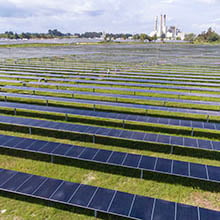
Location
Big Bend Power Station is in southeastern Hillsborough County on Tampa Bay. It sits on nearly 1,500 acres on Big Bend Road in Apollo Beach across from our Manatee Viewing Center. Big Bend’s cooling system provides clean warm water for the manatees that enjoy this refuge during the winter months.
Description
Prior to its 2022 modernization, Big Bend Power Station had four coal-fired units with a combined output of more than 1,700 megawatts. The first unit began service in 1970; the second and third generating units were added in 1973 and 1976, and Unit Four was added in 1985. A natural gas and fuel-oil-fired peaking unit was installed in 2009 to provide additional power during periods of peak demand.
As part of the modernization project, Big Bend Unit 1 was repowered with state-of-the-art combined-cycle technology that eliminated coal as its fuel. Big Bend Unit 1 is Tampa Electric’s most efficient generator and is one of the most efficient of its kind in the nation. The modernized unit can produce 1,090 megawatts, which is enough energy to power more than 250,000 homes. Units 2 and 3 are retired, and Unit 4 remains in operation with coal or natural gas. Big Bend Power Station has a total generating capacity of more than 1,600 megawatts.
Environment
Over its 30-year lifespan, our Big Bend modernization project will save customers more than $700 million. The initiative is part of Tampa Electric’s Net-Zero Carbon Vision for 2050 strategy, which dramatically changes how we generate electricity in effort to reduce carbon emissions.
All Big Bend units continue to meet strict environmental regulations. Big Bend Unit 4 operates pollution control equipment to reduce sulfur dioxide, particulate matter and nitrogen oxides generated through coal combustion using flue gas desulfurization systems or “scrubbers,” electrostatic precipitators and selective catalytic reduction, respectively.
Recyclable byproducts
When Big Bend Unit 4 operates on coal, coal combustion residuals generated are beneficially reused in gypsum, cement, concrete and agricultural industries.
- Gypsum is used locally to make wallboard (drywall), cement and concrete for construction and in agriculture as a soil nutrient or fertilizer.
- Fly ash is a fine particulate material from the combustion of coal. It’s collected in the electrostatic precipitators at Big Bend Unit 4 and is used in the cement and concrete industries.
- Slag, which is collected at the bottom of the furnace, is a hard, glass-like material with many reuses, including in cement. Its hard quality makes it valuable to use as a high-velocity blast material to clean ships, storage tanks and other large metal surfaces.

